Magnetic Field Sensing with Nitrogen-
Vacancy Color Centers in Diamond
The Harvard community has made this
article openly available. Please share how
this access benefits you. Your story matters
Citation
Pham, Linh My. 2013. Magnetic Field Sensing with Nitrogen-Vacancy
Color Centers in Diamond. Doctoral dissertation, Harvard University.
Citable link
http://nrs.harvard.edu/urn-3:HUL.InstRepos:11051173
Terms of Use
This article was downloaded from Harvard University’s DASH
repository, and is made available under the terms and conditions
applicable to Other Posted Material, as set forth at http://
nrs.harvard.edu/urn-3:HUL.InstRepos:dash.current.terms-of-
use#LAA
�
Magnetic Field Sensing with Nitrogen-Vacancy
Color Centers in Diamond
A dissertation presented
by
Linh My Pham
to
The School of Engineering and Applied Sciences
in partial ful�llment of the requirements
for the degree of
Doctor of Philosophy
in the subject of
Applied Physics
Harvard University
Cambridge, Massachusetts
May 2013
�
©2013 - Linh My Pham
All rights reserved.
�
Dissertation Advisors: Ronald Walsworth, Marko Lon£ar
Linh My Pham
Magnetic Field Sensing with Nitrogen-Vacancy Color Centers
in Diamond
Abstract
In recent years, the nitrogen-vacancy (NV) center has emerged as a promising
magnetic sensor capable of measuring magnetic �elds with high sensitivity and spa-
tial resolution under ambient conditions. This combination of characteristics allows
NV magnetometers to probe magnetic structures and systems that were previously
inaccessible with alternative magnetic sensing technologies
This dissertation presents and discusses a number of the initial e�orts to demon-
strate and improve NV magnetometry.
In particular, a wide-�eld CCD based NV
magnetic �eld imager capable of micron-scale spatial resolution is demonstrated; and
magnetic �eld alignment, preferential NV orientation, and multipulse dynamical de-
coupling techniques are explored for enhancing magnetic sensitivity. The further
application of dynamical decoupling control sequences as a spectral probe to extract
information about the dynamics of the NV spin environment is also discussed; such
information may be useful for determining optimal diamond sample parameters for
di�erent applications. Finally, several proposed and recently demonstrated applica-
tions which take advantage of NV magnetometers' sensitivity and spatial resolution at
room temperature are presented, with particular focus on bio-magnetic �eld imaging.
iii
�
Page intentionally left blank
iv
�
Contents
Title Page . . . . . . . . . . . . . . . . . . . . . . . . . . . . . . . . . . . .
Abstract . . . . . . . . . . . . . . . . . . . . . . . . . . . . . . . . . . . . .
Table of Contents . . . . . . . . . . . . . . . . . . . . . . . . . . . . . . . .
List of Figures . . . . . . . . . . . . . . . . . . . . . . . . . . . . . . . . . .
Citations to Previously Published Work . . . . . . . . . . . . . . . . . . .
Acknowledgments . . . . . . . . . . . . . . . . . . . . . . . . . . . . . . . .
i
iii
v
ix
xi
xiii
1 NV Background
1.1
Introduction . . . . . . . . . . . . . . . . . . . . . . . . . . . . . . . .
1.2 NV Physical Structure . . . . . . . . . . . . . . . . . . . . . . . . . .
1.3 NV Formation . . . . . . . . . . . . . . . . . . . . . . . . . . . . . . .
1.3.1 NV incorporation during CVD synthesis
. . . . . . . . . . . .
1.3.2 Nitrogen ion implantation and annealing . . . . . . . . . . . .
1.3.3 N-to-NV conversion . . . . . . . . . . . . . . . . . . . . . . . .
1.4 NV Electronic Structure . . . . . . . . . . . . . . . . . . . . . . . . .
. . . . . . . . . . . . . . . .
1.5 Coherent manipulation of NV spin state
1.5.1 Continuous-Wave Electron Spin Resonance Spectroscopy . . .
1.5.2 Rabi Nutations . . . . . . . . . . . . . . . . . . . . . . . . . .
1.6 NV spin dephasing, decoherence, and relaxation . . . . . . . . . . . .
∗
1.6.1 T
2 spin dephasing time . . . . . . . . . . . . . . . . . . . . . .
1.6.2 T2 spin decoherence time . . . . . . . . . . . . . . . . . . . . .
1.6.3 T1 spin relaxation time . . . . . . . . . . . . . . . . . . . . . .
2 NV Magnetometry
2.1
Introduction . . . . . . . . . . . . . . . . . . . . . . . . . . . . . . . .
2.2 DC magnetometry: ESR . . . . . . . . . . . . . . . . . . . . . . . . .
2.2.1 Description . . . . . . . . . . . . . . . . . . . . . . . . . . . .
Sensitivity . . . . . . . . . . . . . . . . . . . . . . . . . . . . .
2.2.2
2.2.3
Initial demonstrations
. . . . . . . . . . . . . . . . . . . . . .
2.3 DC magnetometry: Ramsey sequence . . . . . . . . . . . . . . . . . .
2.3.1 Description . . . . . . . . . . . . . . . . . . . . . . . . . . . .
1
1
2
4
5
6
9
10
14
15
16
18
20
23
27
29
29
31
31
33
34
36
36
v
�
Contents
2.3.2
2.3.3
Sensitivity . . . . . . . . . . . . . . . . . . . . . . . . . . . . .
Initial demonstrations
. . . . . . . . . . . . . . . . . . . . . .
2.4 AC magnetometry . . . . . . . . . . . . . . . . . . . . . . . . . . . .
2.4.1 Description . . . . . . . . . . . . . . . . . . . . . . . . . . . .
2.4.2
Sensitivity . . . . . . . . . . . . . . . . . . . . . . . . . . . . .
Initial demonstration . . . . . . . . . . . . . . . . . . . . . . .
2.4.3
2.5 Summary . . . . . . . . . . . . . . . . . . . . . . . . . . . . . . . . .
38
39
39
39
43
44
45
3 NV Spin Coherence Dependence on Magnetic Field Misalignment 47
47
49
51
55
3.1
Introduction . . . . . . . . . . . . . . . . . . . . . . . . . . . . . . . .
3.2 NV�13C hyper�ne interactions . . . . . . . . . . . . . . . . . . . . . .
3.3 Results . . . . . . . . . . . . . . . . . . . . . . . . . . . . . . . . . . .
3.4 Summary . . . . . . . . . . . . . . . . . . . . . . . . . . . . . . . . .
4 NV Magnetic Field Imaging
Introduction . . . . . . . . . . . . . . . . . . . . . . . . . . . . . . . .
4.1
4.2 Experimental setup . . . . . . . . . . . . . . . . . . . . . . . . . . . .
4.3 Micron-scale magnetic �eld variations . . . . . . . . . . . . . . . . . .
4.4 Wide-�eld magnetic �eld patterns . . . . . . . . . . . . . . . . . . . .
4.5 Summary . . . . . . . . . . . . . . . . . . . . . . . . . . . . . . . . .
5 Preferential NV Orientation
Introduction . . . . . . . . . . . . . . . . . . . . . . . . . . . . . . . .
5.1
5.2 Preferential NV orientation in {100} samples . . . . . . . . . . . . . .
5.2.1 Results . . . . . . . . . . . . . . . . . . . . . . . . . . . . . . .
5.2.2 Discussion . . . . . . . . . . . . . . . . . . . . . . . . . . . . .
5.3 Enhanced AC magnetometry . . . . . . . . . . . . . . . . . . . . . . .
5.3.1 Results . . . . . . . . . . . . . . . . . . . . . . . . . . . . . . .
5.3.2 Discussion . . . . . . . . . . . . . . . . . . . . . . . . . . . . .
5.4 Summary . . . . . . . . . . . . . . . . . . . . . . . . . . . . . . . . .
57
57
58
59
63
66
67
67
69
69
71
74
74
76
80
6 Dynamical Decoupling
6.3 Dynamical decoupling at low temperature
6.1 Background . . . . . . . . . . . . . . . . . . . . . . . . . . . . . . . .
6.2 Dynamical decoupling at room temperature
. . . . . . . . . . . . . .
6.2.1 Results . . . . . . . . . . . . . . . . . . . . . . . . . . . . . . .
. . . . . . . . . . . . . . .
6.3.1 Results . . . . . . . . . . . . . . . . . . . . . . . . . . . . . . .
6.3.2 Discussion . . . . . . . . . . . . . . . . . . . . . . . . . . . . .
6.4 Multipulse magnetometry . . . . . . . . . . . . . . . . . . . . . . . .
Sensitivity analysis . . . . . . . . . . . . . . . . . . . . . . . .
81
83
86
86
90
91
94
98
6.4.1
98
6.4.2 Results . . . . . . . . . . . . . . . . . . . . . . . . . . . . . . . 100
6.5 Summary . . . . . . . . . . . . . . . . . . . . . . . . . . . . . . . . . 103
vi
�
Contents
7 Spectral Decomposition
7.1.1
7.1.2
7.1.3
106
7.1 Background . . . . . . . . . . . . . . . . . . . . . . . . . . . . . . . . 107
Spectral decomposition technique . . . . . . . . . . . . . . . . 107
Spectral decomposition deconvolution procedure . . . . . . . . 108
Spectral function of a spin bath . . . . . . . . . . . . . . . . . 110
7.2 Results . . . . . . . . . . . . . . . . . . . . . . . . . . . . . . . . . . . 112
Sample C . . . . . . . . . . . . . . . . . . . . . . . . . . . . . 113
Samples F and G . . . . . . . . . . . . . . . . . . . . . . . . . 116
7.3 Discussion . . . . . . . . . . . . . . . . . . . . . . . . . . . . . . . . . 118
7.3.1
Spin bath suppression . . . . . . . . . . . . . . . . . . . . . . 118
7.3.2 Ensemble averaging . . . . . . . . . . . . . . . . . . . . . . . . 120
7.4 Summary . . . . . . . . . . . . . . . . . . . . . . . . . . . . . . . . . 123
7.2.1
7.2.2
8 Outlook
125
8.1 Sensitivity of an NV magnetic sensor . . . . . . . . . . . . . . . . . . 125
8.1.1 Measurement contrast
. . . . . . . . . . . . . . . . . . . . . . 126
8.1.2 Number of photons collected per measurement . . . . . . . . . 127
8.1.3 Coherence Time . . . . . . . . . . . . . . . . . . . . . . . . . . 129
. . . . . . . . . . . . . . 129
8.2 Spatial resolution of an NV magnetic sensor
8.3 Discussion of trade-o�s . . . . . . . . . . . . . . . . . . . . . . . . . . 132
8.4 Applications . . . . . . . . . . . . . . . . . . . . . . . . . . . . . . . . 133
A NV Magnetic Sensitivity
137
A.1 DC magnetometry: ESR . . . . . . . . . . . . . . . . . . . . . . . . . 137
A.2 DC magnetometry: Ramsey sequence . . . . . . . . . . . . . . . . . . 140
A.3 AC magnetometry . . . . . . . . . . . . . . . . . . . . . . . . . . . . 142
B Experimental Apparatus
146
B.1 CCD based wide-�eld �uorescence microscope . . . . . . . . . . . . . 146
B.2 Scanning confocal microscope . . . . . . . . . . . . . . . . . . . . . . 148
B.3 Low temperature setup . . . . . . . . . . . . . . . . . . . . . . . . . . 150
C Coherence Time T2 Theoretical Limit
D Diamond Samples
Bibliography
152
157
161
vii
�
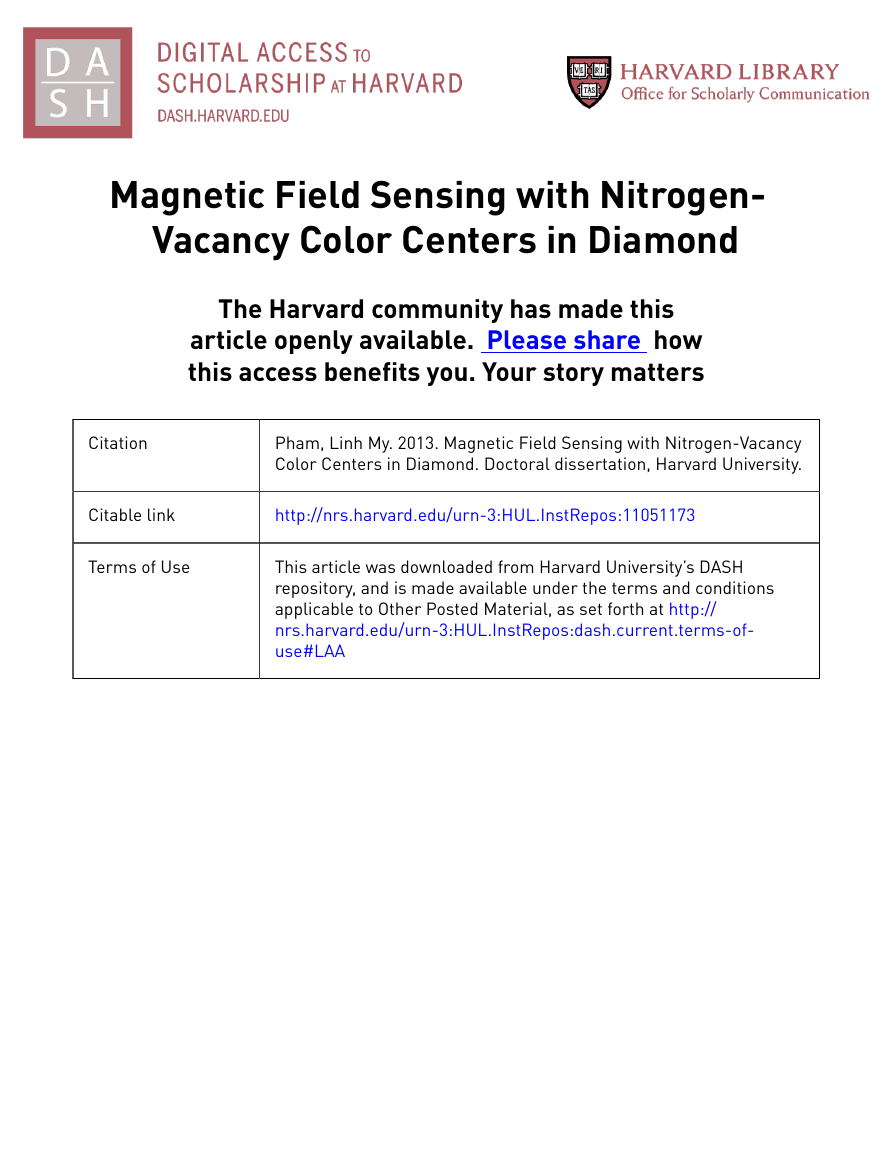
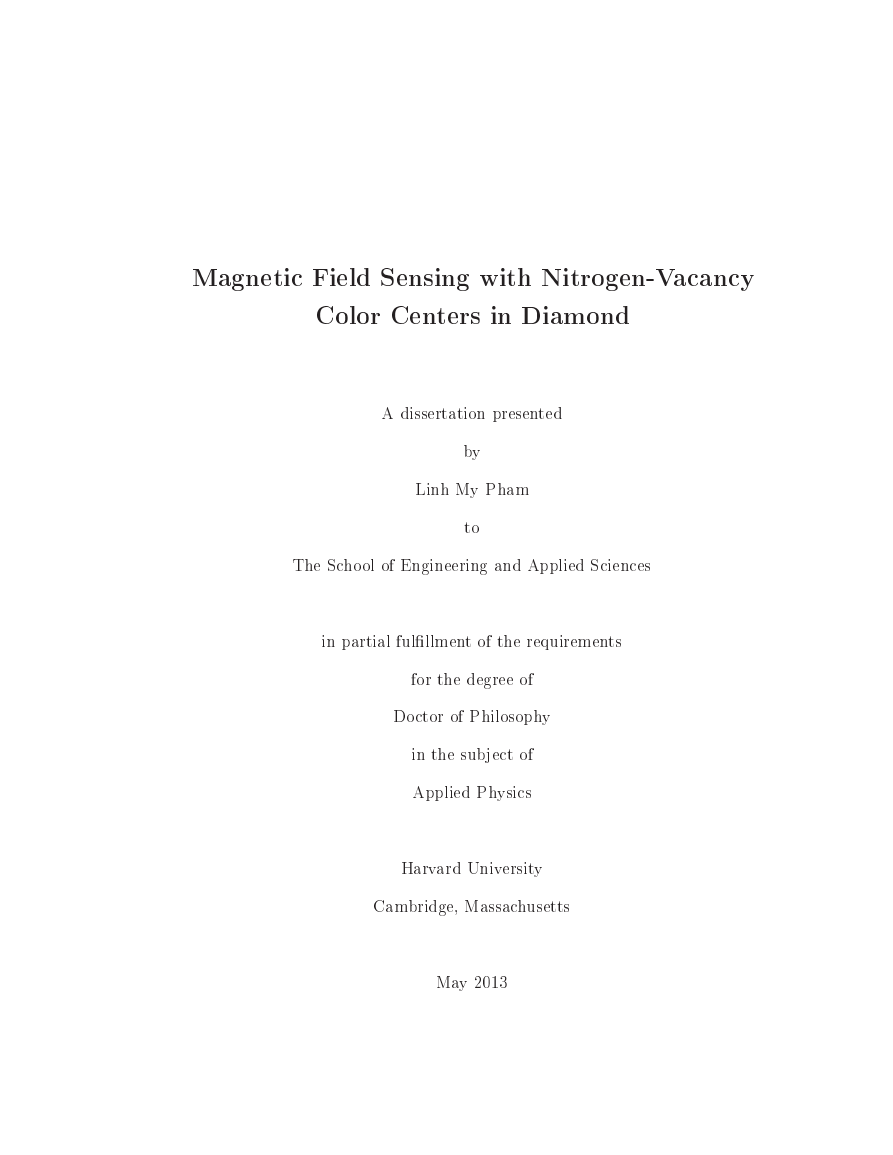

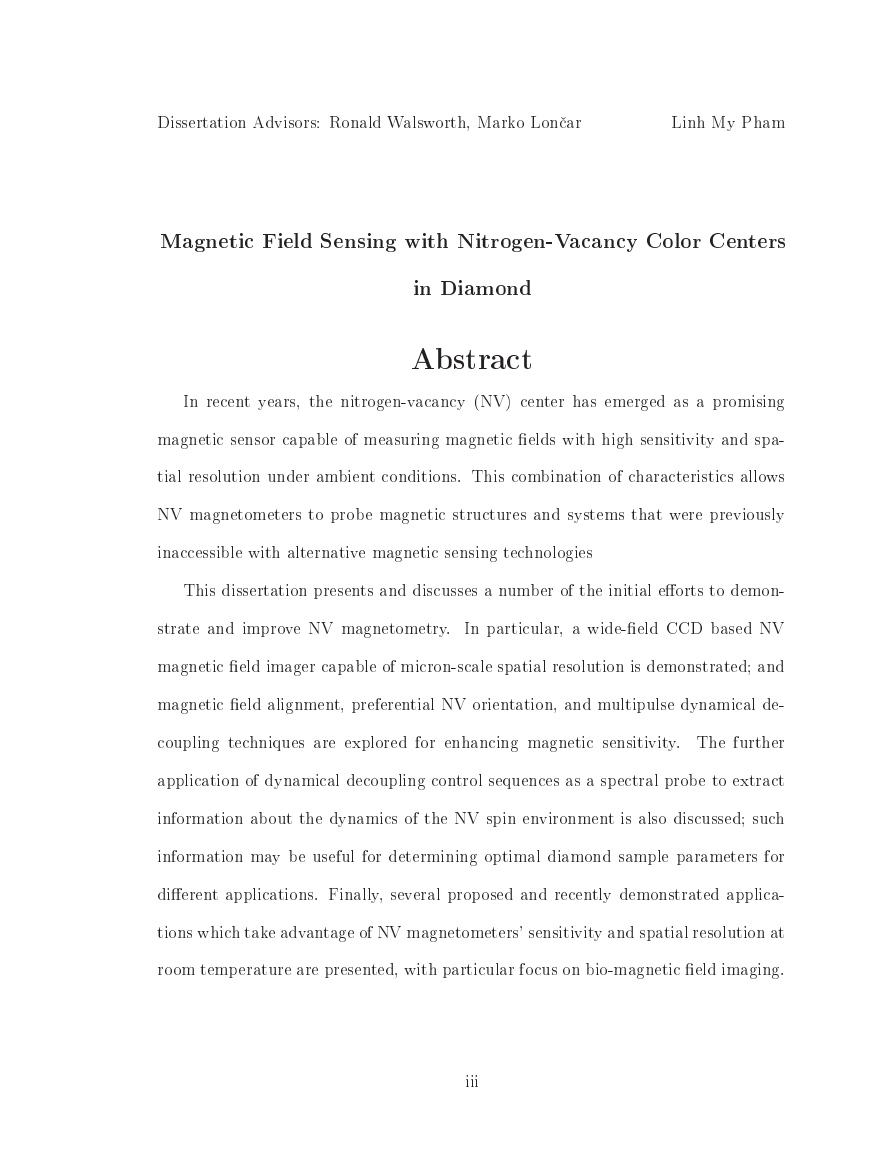

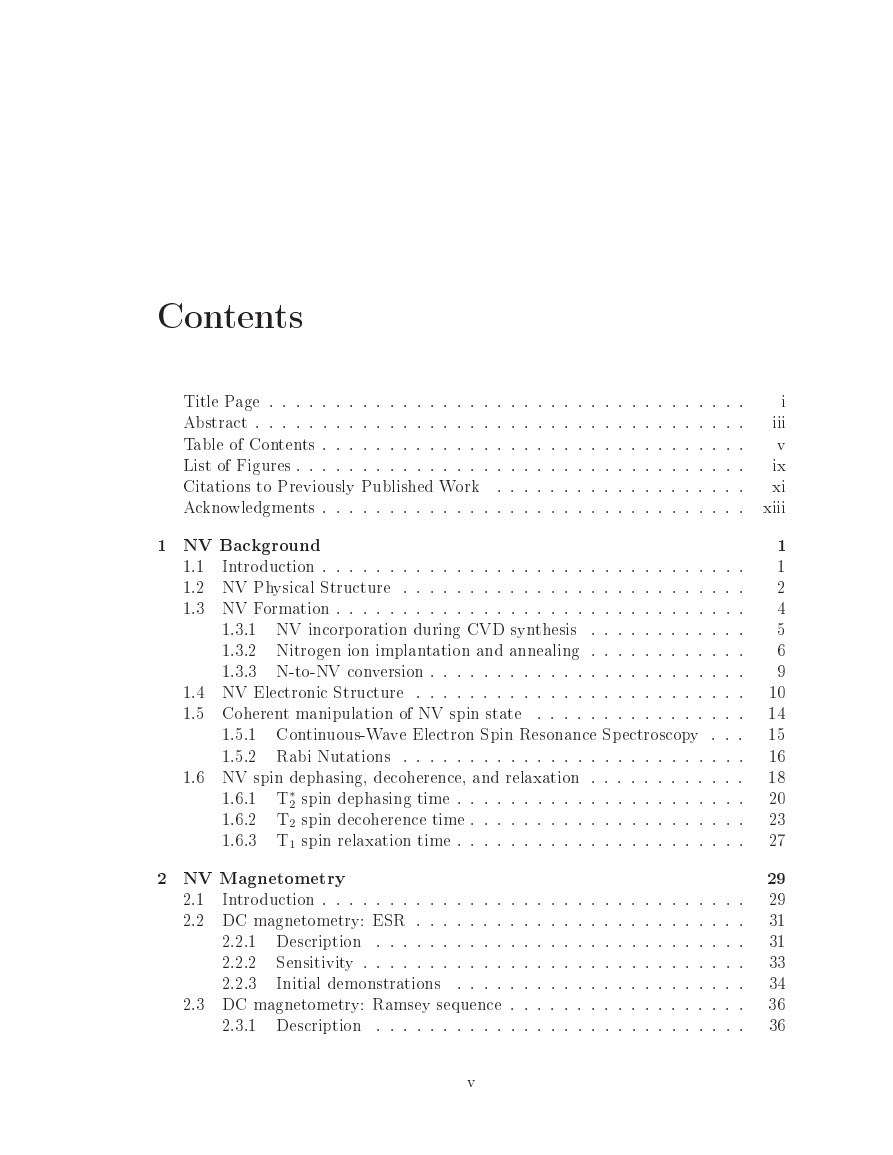
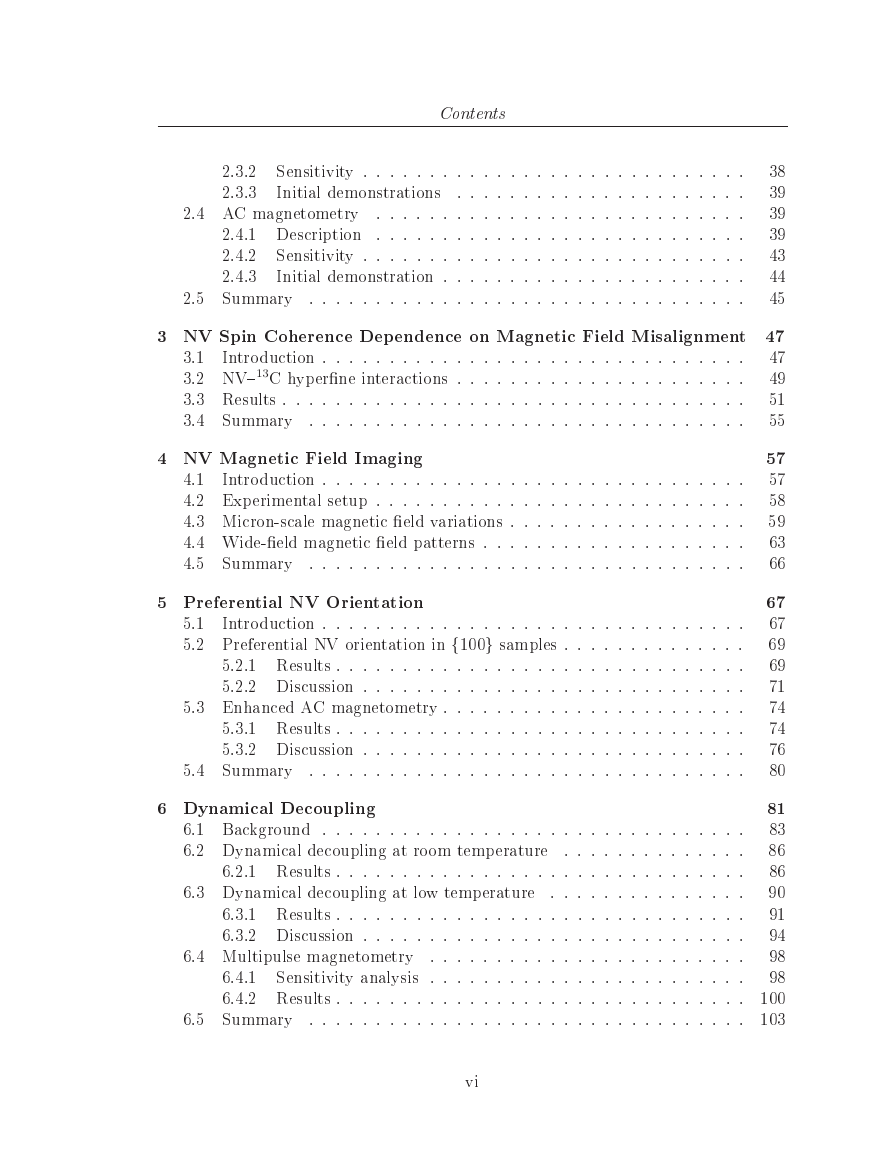
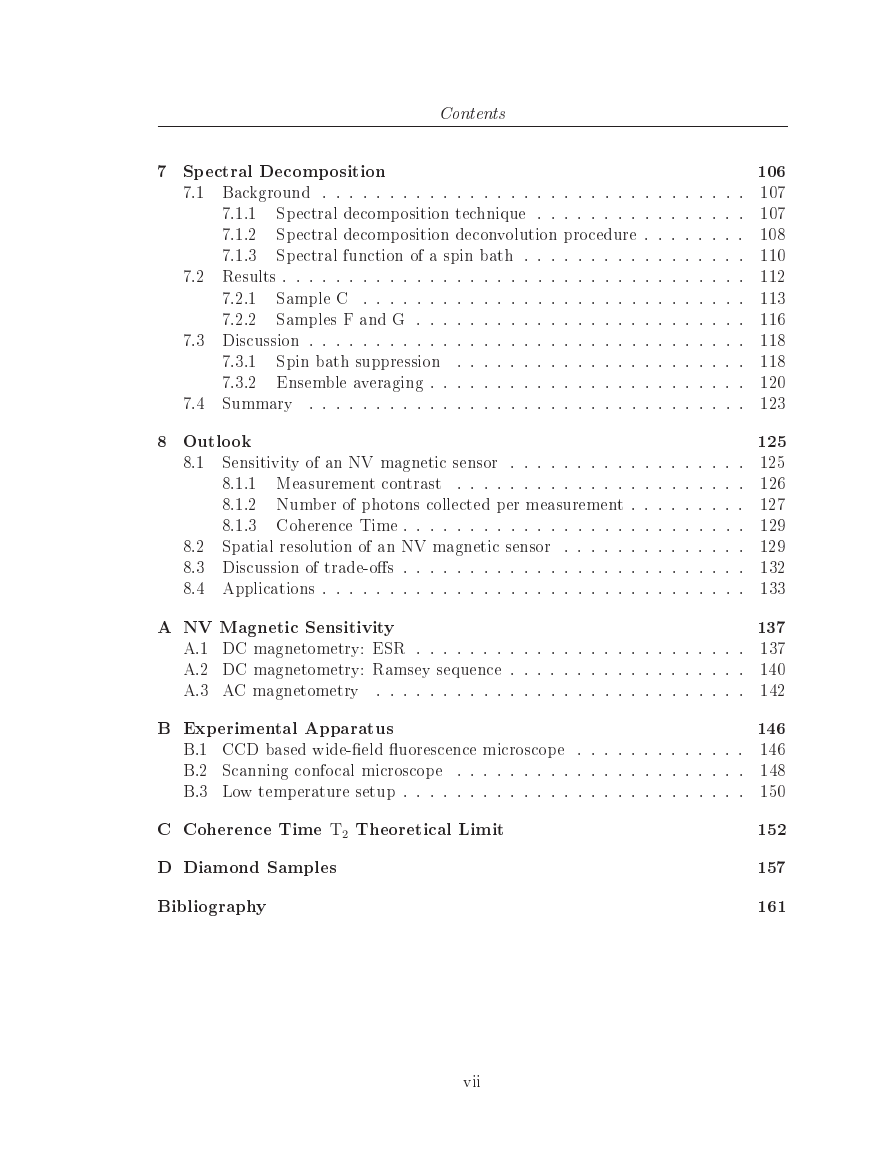








 2023年江西萍乡中考道德与法治真题及答案.doc
2023年江西萍乡中考道德与法治真题及答案.doc 2012年重庆南川中考生物真题及答案.doc
2012年重庆南川中考生物真题及答案.doc 2013年江西师范大学地理学综合及文艺理论基础考研真题.doc
2013年江西师范大学地理学综合及文艺理论基础考研真题.doc 2020年四川甘孜小升初语文真题及答案I卷.doc
2020年四川甘孜小升初语文真题及答案I卷.doc 2020年注册岩土工程师专业基础考试真题及答案.doc
2020年注册岩土工程师专业基础考试真题及答案.doc 2023-2024学年福建省厦门市九年级上学期数学月考试题及答案.doc
2023-2024学年福建省厦门市九年级上学期数学月考试题及答案.doc 2021-2022学年辽宁省沈阳市大东区九年级上学期语文期末试题及答案.doc
2021-2022学年辽宁省沈阳市大东区九年级上学期语文期末试题及答案.doc 2022-2023学年北京东城区初三第一学期物理期末试卷及答案.doc
2022-2023学年北京东城区初三第一学期物理期末试卷及答案.doc 2018上半年江西教师资格初中地理学科知识与教学能力真题及答案.doc
2018上半年江西教师资格初中地理学科知识与教学能力真题及答案.doc 2012年河北国家公务员申论考试真题及答案-省级.doc
2012年河北国家公务员申论考试真题及答案-省级.doc 2020-2021学年江苏省扬州市江都区邵樊片九年级上学期数学第一次质量检测试题及答案.doc
2020-2021学年江苏省扬州市江都区邵樊片九年级上学期数学第一次质量检测试题及答案.doc 2022下半年黑龙江教师资格证中学综合素质真题及答案.doc
2022下半年黑龙江教师资格证中学综合素质真题及答案.doc